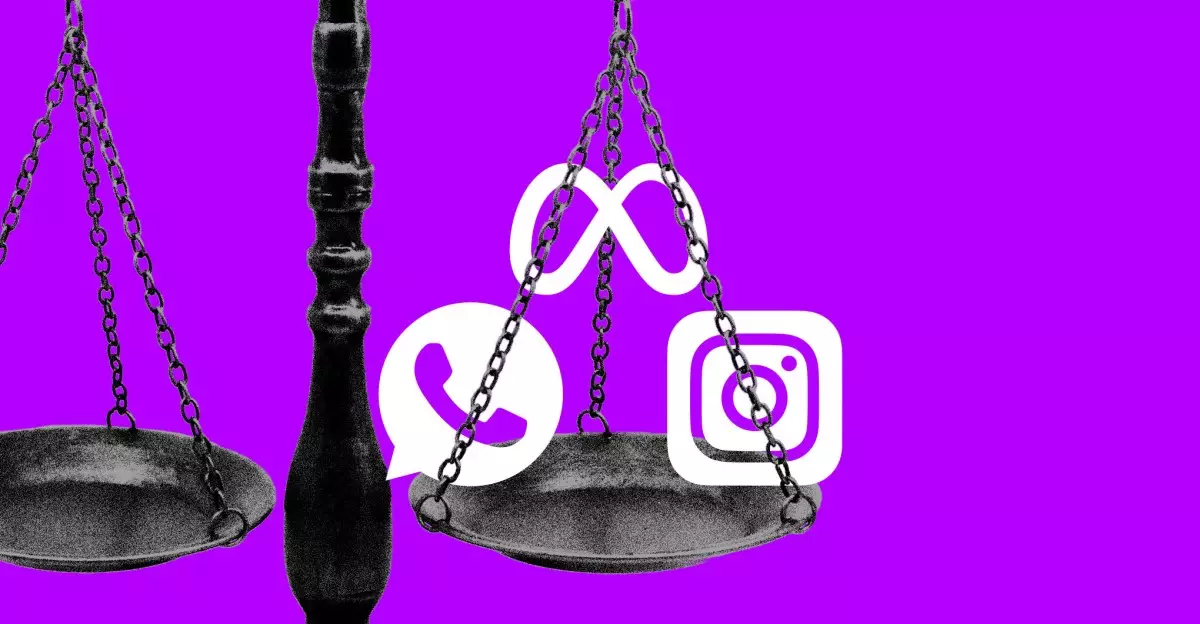In the ongoing legal tussle between the Federal Trade Commission (FTC) and Meta, the tech giant led by Mark Zuckerberg is facing scrutiny over its high-profile acquisitions of WhatsApp and Instagram. The crux of the FTC’s argument hinges on the claim that Zuckerberg’s intentions were less about innovation and more about monopolization—an effort to neutralize competitors in a rapidly evolving digital landscape. Zuckerberg, on the witness stand, devoted hours to attempting to dismantle this narrative, portraying his decisions as strategic investments aimed at propelling Meta into the future rather than extinguishing potential rivals.
This courtroom drama grabbed headlines not just for its implications for Meta, but for the broader tech industry. The stakes are monumental; should the FTC prevail, it could set a precedent that reshapes how tech giants approach acquisitions in the future. Zuckerberg’s testimony, however, presented a narrative laden with confidence, justification, and, interestingly, a touch of vulnerability.
Zuckerberg’s Defense: A Rallying Cry for Innovation
During a particularly telling moment, Zuckerberg was asked about his satisfaction with paying $19 billion for WhatsApp—a purchase many perceived as excessive. His immediate declaration, “I’d do it again,” was telling of a man who believes in his vision. He characterized WhatsApp as a transformative tool, essential for shifting communication from public forums to private messaging—an evolution he was keen to embrace. Rather than viewing WhatsApp solely as a competitor, he framed it as a strategic asset that could help Meta navigate an industry fraught with challenges from titans like Apple and Google.
Zuckerberg also discussed his meetings with WhatsApp’s co-founders, emphasizing their disdain for traditional social media. This sentiment, he argued, actually lent weight to his belief that WhatsApp would unlikely stray into competition with Facebook. In his testimony, he asserted that he actively encouraged the development of social features within WhatsApp—an attempt to enhance, not eliminate, the app’s capabilities. This reflects a pivot from the aggressive “kill the competition” narrative the FTC has constructed, showing instead that he saw potential synergy between these platforms.
The Power Play with Apple and Google
The importance of context cannot be overstated. Zuckerberg’s concerns about the powerhouse duo of Apple and Google underscores a significant dynamic within the tech space. By acquiring platforms like WhatsApp, he sought not just to enhance his user base but to create a bargaining chip against companies that control significant market share through their app stores. “We’re always worried about them messing with us,” he admitted, providing a critical glimpse into the geopolitical skirmishes frontline tech executives face daily.
This attitude reveals more than just business acumen; it exposes a paranoia that has gripped Silicon Valley in recent years as new regulations and antitrust concerns loom on the horizon. Would one man’s efforts to fortify his company against perceived threats ultimately lead to accusations of monopolization? If Zuckerberg’s concerns were legitimate, then perhaps his moves were less about domination and more about survival in an increasingly cutthroat environment.
A Closer Look at Instagram’s Role
Turning to Instagram, another pivotal acquisition, Zuckerberg faced allegations of “neutralizing” an emerging competitor. The testimony painted a complex picture: while he admitted that Instagram could initially take engagement away from Facebook, it was only later, after the app reached a significant milestone of 1 billion users, that he began to feel genuine concern. Until that point, there was little indication that Instagram was quite the threat it has become.
This account raises questions about what constitutes a “real” competitor in the tech world. If Zuckerberg himself didn’t see Instagram as a threat early on, what does that imply about the motivations behind acquiring it? His perspective suggests that acquisitions are less about eliminating competition outright and more about strategic growth—aligning them with business goals in a manner that synergizes user engagement across platforms.
Examining the Fallout from His Choices
Zuckerberg’s exchanges in the courtroom, including reflections from former COO Sheryl Sandberg, who acknowledged having doubts about the Instagram purchase’s cost-effectiveness, indicate a complex internal dialogue at Meta. She later recanted her skepticism, suggesting that the actual outcomes of these acquisitions exceeded not only her expectations but likely those of the broader industry.
This courtroom saga reveals a multifaceted narrative: one in which visionary ambition and opportunism collide. Zuckerberg’s enduring assertion that these acquisitions were not only necessary but catalyzing forces for Meta’s growth leaves us to ponder deeper questions about the moral fabric of competition and innovation. The stakes being played out in this trial are not merely about the fate of a company but the very future landscape of digital interaction. Tech leaders everywhere are watching closely as this drama unfolds, with eyes sharply focused on both its immediate and long-term implications.


Leave a Reply
You must be logged in to post a comment.